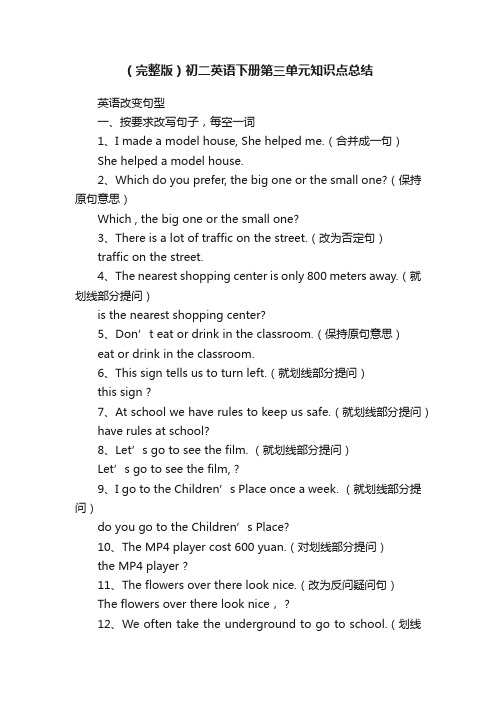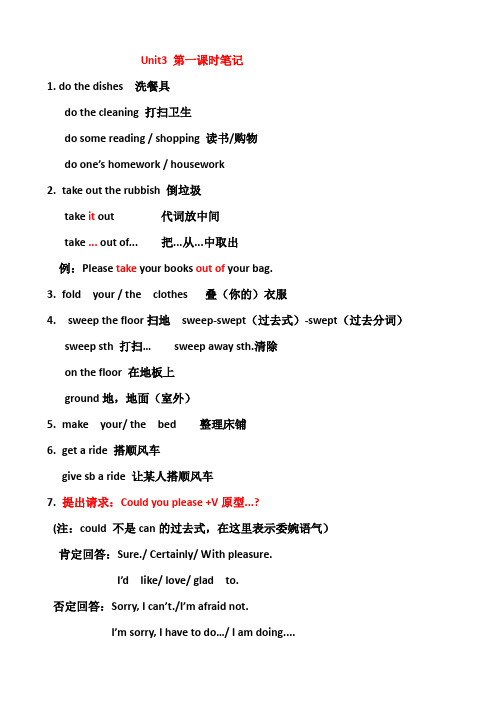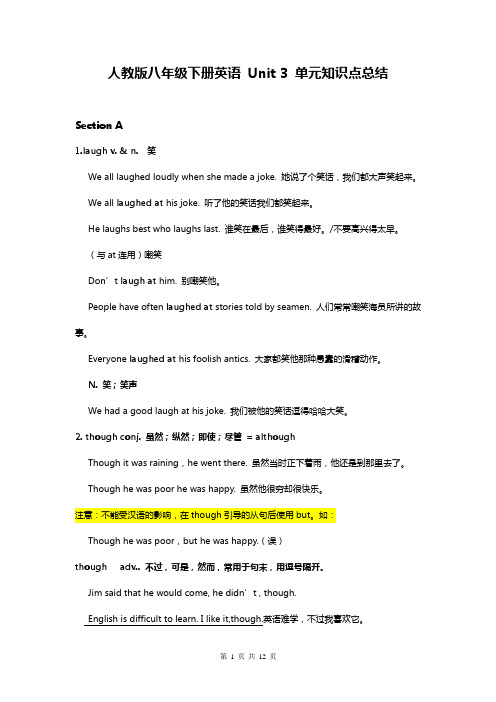(完整版)英语八年级下册第三单元知识点总结
(完整版)八年级英语下册Unit3知识点总结Couldyoupleasecleanyourroom

Unit3 Could you please clean your room?Peter ,could you please take out the trash?彼得,你能把垃圾倒了吗?Could you please do sth ?请你(做)......好吗?用于提出恳求,希望获得对方的必定回答,说话的语气比较客气委宛。
Could不是can的过去式,是委宛、礼貌的说法。
回答用can.【常用答语】必定回答:Sure./ Of course./ Certainly./No problem.否认回答:Sorry , I can’t2、 take out取出(v+ adv)【注】 : 跟代词做宾语,代词放中间;跟名词做宾语,可放在中间,也可放在后边His teeth hurt badly. The dentist take them out .【短语】 take out the trash倒垃圾take a walk take back回收take place发生take off 3. Can you do the dishes.?那你能够洗盘子吗?do the dishes洗碗漫步脱下;take away腾飞拿走,取走【构造 1 】 do the + 名词:do the dishes/ laundry洗餐具/衣服【构造 2 】 do the + 动词 -ing do the cleaning打扫卫生【构造 3 】 do one ’ s +名词do one ’ s housework/ homework做家务/家庭作业【构造 4 】 do some + 动词 -ing do some reading/ shopping读写书/购物Could I at least finish watching this show?起码让我看完这个节目能够吗?1】 Could I do a sth?我能够做......吗?用于表达恳求,语气比较委宛。
(完整版)初二英语下册第三单元知识点总结

(完整版)初二英语下册第三单元知识点总结英语改变句型一、按要求改写句子,每空一词1、I made a model house, She helped me.(合并成一句)She helped a model house.2、Which do you prefer, the big one or the small one?(保持原句意思)Which , the big one or the small one?3、There is a lot of traffic on the street.(改为否定句)traffic on the street.4、The nearest shopping center is only 800 meters away.(就划线部分提问)is the nearest shopping center?5、Don’t eat or drink in the classroom.(保持原句意思)eat or drink in the classroom.6、This sign tells us to turn left.(就划线部分提问)this sign ?7、At school we have rules to keep us safe.(就划线部分提问)have rules at school?8、Let’s go to see the film. (就划线部分提问)Let’s go to see the film, ?9、I go to the Children’s Place once a week. (就划线部分提问)do you go to the Children’s Place?10、The MP4 player cost 600 yuan.(对划线部分提问)the MP4 player ?11、The flowers over there look nice.(改为反问疑问句)The flowers over there look nice, ?12、We often take the underground to go to school.(划线提问)you often go to school?13、Do you live in the city? Do you live in the countryside?(合并成一句)Do you live the city the countryside?14、We are going to see a film this Monday.(就划线部分提问)going this Monday?15、If you want to stay healthy, you should go to bed early. (保持原句意思) Go to bed earlyHealthy.16、Of all the sports I like football best. (保持原句意思)is sport.17、Sam does a lot of homework every evening. (改为否定句)Sam homework every evening.18、Your father has been to Hongkong. (改为反问疑问句)Your father has been to Hongkong , ?19、These hot dogs cost eleven yuan. (就划线部分提问)do these hot dogs ?20、I’m selling American food. (就划线部分提问)are you selling?21、My father is a good cook. (保持原句意思)My father cooking.22、I think she is right. (改为否定句)I think she is .23、His father never goes to work late. (改为反问疑问句)His father never goes to work late, ?24、We shall have some fruit.(改为一般疑问句)we fruit?25、I’d like a piece of pizza. (改为一般疑问句)a piece of pizza?26、Jack may need to buy some chicken wings. (就划线部分提问)Jack to buy?27、There’s much milk in the glass. (改为否定句)milk in the glass.28、This is my watch. (保持原句意思)watch is .29、I need to interview Mr. Wang for my project. (就划线部分提问)you to interview for your project?30、We freeze the meat because it will be fresh for a long time. (就划线部分提问) you the meat?31、It’s twenty minutes’ walk from my home to our school. (就划线部分提问)from your home to your school ?32、Let’s take a picture in front of the building. (改为反问疑问句)Let’s take a picture in front of the building , .33、How do you like the book“Harry Potter”? (保持原句意思)the book“Harry Potter”?34、I liked oranges better than apples. (保持原句意思)I oranges apples.35、I like watching sports news best. (就划线部分提问)of TV programme like best?36、Tom has read some fables in the holidays. (改为否定句)Tom fables in the holidays.37、He left Shanghai the day before yesterday.(改为现在完成时)He from Shanghai two days.38、I’m leaving for New York this coming Wednesday. (就划线部分提问)leaving New York?39、His father never goes to work late. (改为反问疑问句)His father never goes to work late,?40、We have two English lessons on Friday morning. (改为否定句)We English lessons on Friday morning.41、Are you ready for the coming test? (保持原句意思)the coming test?42、I’m going on a trip to B eijing with my parents in the summer holidays. (就划线部分提问)going on a trip to Beijingin the summer holidays?43、The man is good at singing. (保持原句意思)The man singing.44、He can hardly believe that maglev runs so fast. (改为反问疑问句)He can hardly believe that maglev runs so fast, ?45、He doesn’t like winter. Neither does his sister.(合并成一句)he his sister likes winter.用所给单词的适当形式填空Don’t make so much_________(noisy)! My father is writing.Some_____________(Australia) like to camp in the coutryside at weekend. It’s v ery _________(relax) to listen to de songs.It’s very________(pleased) to meet you.City life is very _________(difference) form the country life.We must not ride bicycles here. It’s a ________(warn) sign.Why don’t we go _______(camp) this weekend?It is a _______(use) information for me,I think.A:What does this sign ______(meaning)?B:We mustn’t eat or drink here.10、Can you make your life more____________?(enjoy)11、I like living in the suburbs. It’s quiet and _______.(peace)12、People have their own way of _________.(relex)13、My uncle Jack likes _______in the suburbs.(live)14、My computer is ___________.It doesn't work now.(break)15、He used to __________when he was young.(smoking)16、Do you read newspaper _________?(regular)17、The film called “Computer War” is veay ________.(excited)18、Don’t fall ________ in class,Sam.(sleep)19、Let’s buy some food and ________ for the party.(drink)20、If you use your own head, maybe you will make_______mistakes.(few)21、Children, __________ l want to show you a wonderful picture.(first)22、Shanghai is an _________city,isn’t it?(national)23、Mrs Brown likes to take care of _______cats and dogs.(home)24、I felt very _______after the hard work.(tire)25、________, I am going to read several books during the holiday. (second)26、________,I am going to have a trip with my friends during the festival.(third)27、We had a _______ birthday party for my brother at bother at home last Sunday.(surprised)28、What ______ it is to have the party!(fun)29、Jack was very ________ with the birthday present. (prease)30、David is a friandly man , _________in the town knows him.(every)31、I look forword to _________ the film.(see)32、She got the _________fish form the shop. (freeze)33、Please stir the _______ with a spoon.(mix)34、My father owns a big _________boat. He is a fisherman.(fish)35、Let’s study the ________lesson now. (four)36、If you want to stay healthy, you should exercise__________.(regular)37、We are going to go on an _________ this weekend.(out)38、If you want to be __________,you must eat less junk food.(healthy)39、How many__________ dogs and cats are there in the town?(home)40、Children should not often eat _________food.(freeze)41、There is a ___________ sign on the wall.(direct)42、__________, you must finish it yourself. (second)43、I have a beach hut and I like_________ there.(relax)44、Is there any ________food in the fridge? (freeze)45、The weather is usually ________ here in April. (pleasure)46、We must not leave rubbish. It’s a _________ sign. (warn)47、He nodded his head in __________ ,then walked home. (silent)48、We must stop here. It’s a _________sign. (instruct)49、It’s a good habit to do morning exercise __________. (regular)50、This book is very _________ to me. (help)新目标八年级英语第三单元I. 应掌握的词组:1. babysit one’s sister 照顾妹妹2. visit one’s grandmother 看望奶奶3. spend time with friends和朋友们一起度过时光4. visit cousins 看望表弟等5. Go to sports camp 去运动野营6.go to the beach 去海滩7. go camping 去野营8. Go shopping 去买东西9. go swimming 去游泳10. go boating去划船11. go skating 去溜冰12. go walking去散步13. go climbing 去登山14. go dancing去跳舞15. go hiking 去徒步远足16. go sightseeing 去观光17. go house-hunting 去找房子18.go on a hike 徒步旅行,go bike riding 骑自行车旅行,go fishing 去钓鱼19. do some shopping 买东西20. do some washing 洗衣服21. do some cooking 作饭22. do some reading 读书23. do some speaking训练口语24. do some sewing 做缝纫活25.that sounds nice 那好极了26. at home 在家27. how about=what about ……怎么样?28. how long 多长时间29. how far 多远30. how often 多长时间一次31. how much, how many 多少32. have a good time =have fun= have a wonderful time= enjoy oneself玩得高兴,过得愉快33. show sb. Sth.=show sth. to sb.出示某物给某人看give me the book=give the book to me 给我书,pass me the cup=pass the cup to me 把杯子递给我,sell me the house=sell the house to me 把房子卖给我buy me a book =buy a book for me 给我买书,make me a cake=make a cake for me给我做蛋糕44. Ask her about her plans 向她询问她的计划ask sb. about sth.向某人询问某事45. forget to do sth. 忘记要做某事,forget doing sth. 忘记做过某事II. 应该掌握的句子:1.What are you doing for vacation? I’m babysitting my sister.假期你要做什么?我要照顾我的妹妹。
八年级英语下册第三单元笔记

八年级英语下册第三单元笔记一、重点单词。
1. rubbish.- n. 垃圾;废弃物。
例如:There is a lot of rubbish on the street.(街道上有很多垃圾。
)2. fold.- v. 折叠;对折。
如:Fold the paper in half.(把纸对折。
)3. sweep.- v. (swept, swept) 扫;打扫。
例如:I sweep the floor every day.(我每天扫地。
)4. floor.- n. 地板;地面。
如:The book is on the floor.(书在地板上。
)5. mess.- n. 杂乱;不整洁。
例如:What a mess!(多么杂乱啊!)6. throw.- v. (threw, thrown) 扔;掷。
例如:Don't throw rubbish everywhere.(不要到处扔垃圾。
)7. neither.- adv. 也不。
用于否定句中,表示前面所说的情况也适用于后者。
例如:He doesn't like apples, neither do I.(他不喜欢苹果,我也不喜欢。
)- pron. 两者都不。
例如:Neither of them is right.(他们两个都不对。
)8. shirt.- n. 衬衫。
如:This is a white shirt.(这是一件白色的衬衫。
)9. pass.- v. 给;递;走过;通过。
例如:Pass me the salt, please.(请递给我盐。
);He passed the exam.(他通过了考试。
)10. borrow.- v. 借;借用。
例如:Can I borrow your pen?(我能借用你的钢笔吗?)11. lend.- v. (lent, lent) 借给;借出。
例如:I can lend you some money.(我可以借给你一些钱。
人教部编版八年级英语下册3单元笔记重点汇总

Unit3 第一课时笔记1. do the dishes 洗餐具do the cleaning 打扫卫生do some reading / shopping 读书/购物do one’s homework / housework2.take out the rubbish 倒垃圾take it out 代词放中间take ... out of... 把...从...中取出例:Please take your books out of your bag.3.fold your / the clothes 叠(你的)衣服4.sweep the floor扫地sweep-swept(过去式)-swept(过去分词)sweep sth 打扫…sweep away sth.清除on the floor 在地板上ground地,地面(室外)5.make your/ the bed 整理床铺6.get a ride 搭顺风车give sb a ride 让某人搭顺风车7.提出请求:Could you please +V原型...?(注:could 不是can的过去式,在这里表示委婉语气)肯定回答:Sure./ Certainly/ With pleasure.I’d like/ love/ glad to.否定回答:Sorry, I can’t./I’m afraid not.I’m sorry, I have to do…/ I am doing....I’d love to, but I....这个句型的否定形式:Could you please not +V原型...? 请不要...可以吗?8.征求同意:Could I …?例:Could I go out with friends, mom?肯定回答:Yes, you can./ Sure./Of course.否定回答:No, you can’t. You need to…注意:不用could回答9.work on 从事于,致力于10. help out (with something)是一个动词短语,表示在某人繁忙或是遇到困难时“给予帮助”。
英语八年级下册unit3知识点

英语八年级下册unit3知识点英语八年级下册Unit3主要是涉及到旅游及热门景点相关内容。
在这一单元中,我们学习了许多关于出行的单词和词组,同时也学习了旅游方面的文化知识。
下面,本文将围绕这些知识点,总结归纳出本单元的核心知识点。
第一部分:旅游方面的单词和词组1. sightseeing:观光2. destination:目的地3. travel,journey:旅行4. tour:游览5. accommodation:住宿6. transportation:交通7. ticket:票8. guide:导游9. excursion:短途旅游我们应该注意这些单词的正确发音和用法,使自己的英语更加准确清晰。
第二部分:旅游方面的文化知识1. 美食文化:在旅游中品尝当地的美食也是很重要的一部分。
比如在中国,烤鸭和火锅就是很受外国人欢迎的美食。
在日本,则是寿司和生鱼片。
2. 交通文化:在不同国家,交通方式也是各不相同的。
比如在欧洲,大多数人选择步行或骑行,而在中国城市,公共交通比较发达,人们通常乘坐地铁、公交车等。
3. 饮食礼仪:在不同国家,饮食礼仪也是有所不同的。
比如在中国,用餐时要招待客人,避免用筷子顶餐盘等等礼仪问题。
在日本,则更注重吃饭时的细节和仪式感。
第三部分:热门景点在这个单元中我们还学习了关于热门景点的话题。
下面介绍一些世界著名热门景点。
1. 埃菲尔铁塔:法国巴黎的标志性建筑。
2. 自由女神像:位于美国纽约港口,是法国人向美国人赠送的礼物。
3. 金门大桥:连接美国旧金山和马林县,是世界上最著名的桥梁之一。
4. 罗马斗兽场:意大利罗马的古代竞技场,是世界历史上最著名的文化遗产之一。
5. 万里长城:中国的镇国之宝,是目前世界上保存最完好、规模最宏大的古代筑墙工程。
总结:英语八年级下册Unit3,主要涉及旅游方面的单词和词组、旅游方面的文化知识和世界著名热门景点。
我们可以通过学习这些知识点,提高我们的英语交流能力,也可以更好地了解和欣赏不同国家的风土人情。
人教版八年级下册英语第三单元知识点

人教版八年级下册英语第三单元知识点Unit 3 Could you please clean your room?一、重点短语1.go out for dinner出去吃饭2.stay out late在外面待到很晚3.go to the movies去看电影4.geta ride搭车5.work on从事6.cleanand tidy干净洁7.do the dishes洗餐具8.takeout the rubbish倒垃圾9.fold your/the clothes叠衣服10.sweepthe floor扫地11.make your/the bed整理床铺12.cleanthe living room打扫客厅13.no problem没问题14.welcomesb.欢迎某人e home fro m school/work放学/下班回家16.throw down扔下17.sit down坐下eover过来19.take sb.for a walk带某人去散步20.all the time总是21.all day/evening整日/夜22.dohousework做家务23.shout back大声回应24.walkaway走开25.a comfortable home一个舒适的家26.share the housework分担家务27.get some thing to drink拿点喝的东西28.insurprise惊讶地29.watch one show观看节目30.hangout闲逛31.pass sb.sth.把某物传给某人32.lend sb.sth.把某物借给某人33.get sth.wet使某物弄湿34.hate to do sth.讨厌做某事35.help sb.to do/with sth帮助某人干某事36.do chores做杂务37.bring a tent带顶帐篷来38.buy some snacks买些小吃39.invite sb to a party邀请某人参加聚会40.go to the store去商店41.make sb.do sth使某人做某事42.enough stress足够的压力43.a waste of time浪费时间44.inorder to为了45.get goodgrades取得好成绩46.minddoing sth.介意做某事47.developchildren’s independence发展孩子的独立性48.dependon依赖49.do ones part in(doing)sth.做某人分内的事50.look after/take care of 照顾;51.finish doing sth.完成做某事二、知识点解析1.“Could you please do sth.?”的答语以下两种情况:接受请求时可以用Yes,sure./Sure./Of course./Certainly./No problem./My pleasure./It’s my pleasure./With pleasure.等来回答拒绝请求时可以用Sorry./Sorry,I can’t.等来回答,还可以用Ihave to do sth.来解释其否定句是:“Could youplease not do sth.?”2.有关“家务劳动”有关的短语:takeout the rubbish/trash倒垃圾foldone’s clothes叠衣服sweepthe floor扫地cleanthe room打扫房间makeone’s/the bed铺床dothe dishes/wash the dishes洗餐具3.throw down扔下throwat扔向,掷向throw away扔掉例题:Recycling is good,so don’t__________bottles or newspapers.A.find outB.hand ine upD.throw away4.the minute表示“一…….就……”,相当于as soon as.(引导时间状语从句)e.g.:I’ll tell himthe minute he gets there.5.常见time的短语:all the time一直,总是at times不时,有时in time及时on time按时forthe first time第一次in no time立刻at any time随时bythe time到...的时候atthe same同时have a good/great/wonderful time玩的愉快例题:---Hurry up.It’s almost time for school.---Don’t worry.We are sure to be atschool__________.A.at timesB.on timeC.all the timeD.by the time6.as….as表示“和……一样”,之间要用形容词或副词的原级。
(完整版)英语八年级下册第三单元知识点总结

(完整版)英语⼋年级下册第三单元知识点总结Unit 3. Could you please clean your room?⼀、短语动词1、take out 带出去;取出;拔出;除掉动副词组代词作宾语时必须放在两词之间。
2、come over 固定短语过来,顺便来访,拜访。
后⾯加介词to,后接表⽰地点的名词作宾语。
拓展:take out of 把---从---取出/带出3、hang →hung→hung hang out 闲逛;溜达。
4、throw down扔下;随⼿丢下其中throw可⽤作及物或不及物动词,意为扔,掷→threw→thrown拓展:throw at向----扔去(带有攻击性)throw to 扔给---(不含恶意)throw away扔掉SectionB1、take care of 照顾;照料。
相当于look after后可接名词、(反⾝)代词作宾语。
Take good care of相当于look after well2、⼆、动词⽤法1、finish 及物动词完成后跟名词、代词或动词ing形式作宾语。
拓展:与finish⼀样⽤法的动词或动词短语有:enjoy/look forward to/mind/have fun/practice/be busy/consider/feel like/give up2、pass⽤作及物动词给;递;pass sb sth =pass sth to sb把某物递给某⼈。
⾛过、通过(考试等)作不及物动词,(时间)过去,流逝3、borrow sth from sb向某⼈借某物。
⾮延续性动词Lend(lent;lent) sb sth=lend sth to sb借给某⼈某物。
⾮延续性动词Keep 由“保存”引申为“借”,延续性动词,可与时间段连⽤。
四川-----Excuse me,can I_____your pen?-----sorry,I have_____it to Bob.A.borrow;lendB.borrow;borrowedC.lend;borrowedD.lend;lent4、hate及物动词厌恶;讨厌,表⽰⼀种感情或⼼理状态,不能⽤于进⾏时态。
人教版八年级下册英语 Unit 3 单元知识点总结(含练习题及答案)

人教版八年级下册英语Unit 3 单元知识点总结Section Augh v. & n. 笑We all laughed loudly when she made a joke. 她说了个笑话,我们都大声笑起来。
We all laughed at his joke. 听了他的笑话我们都笑起来。
He laughs best who laughs last. 谁笑在最后,谁笑得最好。
/不要高兴得太早。
(与at连用)嘲笑Don’t laugh at him. 别嘲笑他。
People have often laughed at stories told by seamen. 人们常常嘲笑海员所讲的故事。
Everyone laughed at his foolish antics. 大家都笑他那种愚蠢的滑稽动作。
N. 笑;笑声We had a good laugh at his joke. 我们被他的笑话逗得哈哈大笑。
2. though conj. 虽然;纵然;即使;尽管= althoughThough it was raining,he went there. 虽然当时正下着雨,他还是到那里去了。
Though he was poor he was happy. 虽然他很穷却很快乐。
注意:不能受汉语的影响,在though引导的从句后使用but。
如:Though he was poor,but he was happy.(误)though adv.. 不过,可是,然而,常用于句末,用逗号隔开。
Jim said that he would come, he didn’t , though.English is difficult to learn. I like it,though.英语难学,不过我喜欢它。
3. quietly轻声地,安静地,平静地quiet轻声的,安静的,平静的The students walked to a quiet place.同学们向一个安静的地方走去。
- 1、下载文档前请自行甄别文档内容的完整性,平台不提供额外的编辑、内容补充、找答案等附加服务。
- 2、"仅部分预览"的文档,不可在线预览部分如存在完整性等问题,可反馈申请退款(可完整预览的文档不适用该条件!)。
- 3、如文档侵犯您的权益,请联系客服反馈,我们会尽快为您处理(人工客服工作时间:9:00-18:30)。
Unit 3. Could you please clean your room?一、短语动词1、take out 带出去;取出;拔出;除掉动副词组代词作宾语时必须放在两词之间。
2、come over 固定短语过来,顺便来访,拜访。
后面加介词to,后接表示地点的名词作宾语。
拓展:take out of 把---从---取出/带出3、hang →hung→hung hang out 闲逛;溜达。
4、throw down扔下;随手丢下其中throw可用作及物或不及物动词,意为扔,掷→threw→thrown拓展:throw at向----扔去(带有攻击性)throw to 扔给---(不含恶意)throw away扔掉SectionB1、take care of 照顾;照料。
相当于look after后可接名词、(反身)代词作宾语。
Take good care of相当于look after well2、二、动词用法1、finish 及物动词完成后跟名词、代词或动词ing形式作宾语。
拓展:与finish一样用法的动词或动词短语有:enjoy/look forward to/mind/have fun/practice/be busy/consider/feel like/give up2、pass用作及物动词给;递;pass sb sth =pass sth to sb把某物递给某人。
走过、通过(考试等)作不及物动词,(时间)过去,流逝3、borrow sth from sb向某人借某物。
非延续性动词Lend(lent;lent) sb sth=lend sth to sb借给某人某物。
非延续性动词Keep 由“保存”引申为“借”,延续性动词,可与时间段连用。
四川-----Excuse me,can I_____your pen?-----sorry,I have_____it to Bob.A.borrow;lendB.borrow;borrowedC.lend;borrowedD.lend;lent4、hate及物动词厌恶;讨厌,表示一种感情或心理状态,不能用于进行时态。
Hate sb/sth不喜欢某人或某物Hate to do/doing sth 厌恶做某事(某一次或经常性的)相当于like的用法。
SectionB1、invite及物动词邀请名词invitation 邀请;请帖。
Invite sb to +地点名词。
邀请某人到某地。
Invite sb to do sth 邀请某人做某事。
2、make sb do sth 让某人做某事。
3、动词辨析:单词主语常用结构含义Spend(spent) 人sb spend time/money on sthSb spend time/money doing sthPay(paid) 人sb pay money for sthCost(cost) 物sth cost sb some moneyTake(took) it作形式主语it takes sb some time to do sth四川:-----I_________a lot of time palying computer games everyday. ----oh,boy.it’s bad for your eyes.A.spendB.takesC.pay4、provide sth for sb =provide sb with sth给某人提供某物Offer sb sth =offer sth to sb主动给某人提供某物Offer to do sth 主动提出做某事。
5、depend on依靠;依赖independent独立的independence独立性6、develop作及物动词或不及物动词发展;壮大。
Development 发展。
Developed/developing 前者是发达的后者是发展中的。
7、Have no idea 相当于don't know 不知道8、drop(dropped)→dropping(1)drop意为“丢失或落下”时,既可以作及物动词,也可以作不及物动词。
如:She was scared and dropped the cup.她吓坏了,丢落了茶杯。
The glass dropped from her hand.玻璃从她的手中掉了下来。
(2)drop作动词还有“(价格)下降;放弃”的意思,如:The price of the rice has dropped.大米的价格已经降下来了。
Don't drop math.别放弃数学。
(3)drop也可作名词,表示“滴”,如:A drop of rain fell on my face.一滴雨落在我的脸上。
(4)drop还可指“下跌;落下的距离”,如:There was a sudden drop in the temperature yesterday.昨天气温大幅下降。
拓展:drop behind 落后drop in/by偶然拜访eye drops 眼药水 a drop in the ocean沧海一粟Drop out of school辍学三、名词1、rubbish 不可数名词垃圾,废弃物2、mess名词杂乱;不整洁。
常用短语:in a mess 乱七八糟3、chores 家务可数名词Housework(homework)家务不可数名词SectionB1、stress不可数名词,精神压力;心理负担。
Under the stress of 在---压力之下。
2、waste 名词浪费 a waste of time 浪费时间不可数名词废物;垃圾;浪费作形容词无用的;废弃的;丢弃的。
作及物动词浪费四、形容词五、副词Section B1、anyway 副词而且;加之。
The coat is too expensive and anyway I don’t like the color.还可意为“不管怎样,无论如何,即使这样。
Anyway ,it’s worth trying.The water was cold but he took a shower anyway.六、介词短语1、in front of在---面前;是指在一定范围外。
in the front of 在----前部,是指在一定范围内。
广东中考----why are you standing,Alice?-----I can’t see the blackboard clearly.two tall boys are sitting_________me.A.behindB.next toC.betweenD.in front of2、in surprise 惊讶地;惊奇地,常用作状语。
拓展:to one’s surprise 使某人吃惊的是,常放在句首,作状语。
sectionB1、in order to目的是;为了后接动词原形,引导目的状语。
位置可放在句首,也可放在句中。
否定为:in order not to do.In order that 后面接从句,表示目的,从句中常含有情态动词。
广东:in order _______for the meeting,my sister forced herself to get up early this morning.A.not to be lateB.not being lateC.to be lateD.being late3、as a result 结果;因此拓展:as a result of 由于----;作为------的结果。
七、连词1、the minute意为“一----就----”引导时间状语从句,其后省略了引导词that相当于the moment或as soon as(通常情况下主从句时态要一致。
但若主句用一般将来时,从句则要用一般现在时表将来。
)哈尔滨:boys and girls,calm down and focus on the test paper____you begin to think about the answers.Be confident.you can do it.A.as ifB.as soon asC. although2、 when是at or during the time that, 既指时间点,也可指一段时间;while是during the time that,只指一段时间,因此when引导的时间状语从句中的动词可以是终止性动词,也可以是延续性动词,而while从句中的动词必须是延续性动词。
②when 说明从句的动作和主句的动作可以是同时,也可以是先后发生;while 则强调主句的动作在从句动作的发生的过程中或主从句两个动作同时发生。
③由when引导的时间状语从句,主句用过去进行时,从句应用一般过去时;如果从句和主句的动作同时发生,两句都用过去进行时的时候,多用while引导,如:a. When the teacher came in, we were talking.当此句改变主从句的位置时,则为:While we were talking, the teacher came in.b. They were singing while we were dancing.SectionB1、since 由于;因为;既然,引导原因状语从句,通常放在句首。
还可引导时间状语从句,自---以来。
一般用在完成时当中。
八、特殊句型1、as ---as---与---一样,用于同级比较。
第一个as为副词,后跟形容词或副词的原级;第二个为连词,引导比较状语从句。
否定形式:not as/so ---as---,不如----2、neither+连系动词be/助动词/情态动词+主语----也不。
这是一个倒装句,表示上句否定的情况也同样适合后者。
So+连系动词be/助动词/情态动词+主语----也是。
这是一个倒装句,表示上句肯定的情况也同样适合后者。
拓展:neither+主语+连系动词be/助动词/情态动词----的确不是这样。
(表示说话者同意上文中说话者的否定观点。
)So+主语+连系动词be/助动词/情态动词-----的确是这样。
表示说话者同意上述说话者说出的观点。
福建----last night I didn't watch the TV show。
A Bite of China 2 -----_______did I.I was preparing for today’s test then.A.SoB.EitherC.NeitherSectionB1、do one’s part in (doing ) sth 尽某人的职责做某事。
